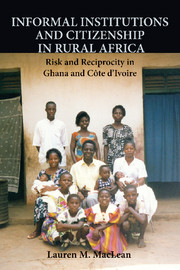 Informal Institutions and Citizenship in Rural Africa
Informal Institutions and Citizenship in Rural Africa Published online by Cambridge University Press: 05 May 2010
African political economies are not always and everywhere in crisis. Indeed, over the past 100 years, the countries of Ghana and Côte d'Ivoire in West Africa have been considered successful models of democratic and economic development at different points. We cannot understand the varied paths of the Ghanaian and Ivoirian political economies by solely focusing at the macro level on state weakness, or by exclusively concentrating at the micro-level on the deficits of social capital or missing institutions. In this book, we travel to similar villages in the countryside on either side of the Ghana–Côte d'Ivoire border to see how the history of people's experience of state-building has fundamentally transformed economics and politics from the ground up.
A little more than 100 years ago, prior to European colonial rule, an outsider traveling to the four Akan villages selected for this study in the forest zone of West Africa would have found communities with very similar political histories, economies, social organization, and cultures. As the Asante Empire began to centralize and expand in the mid-seventeenth century in what is now Ghana, these Akan groups resisted incorporation. Instead, they chose to migrate farther westward of the Asante capital of Kumasi to what is now the southwestern part of Ghana and the southeastern part of Côte d'Ivoire. (SeeFigures 1.1 and 1.2.) The Akan peoples in these fieldsite villages thus shared similar village chieftancies, matrilineal family systems, and customary systems of land tenure, inheritance, and justice.
To save this book to your Kindle, first ensure [email protected] is added to your Approved Personal Document E-mail List under your Personal Document Settings on the Manage Your Content and Devices page of your Amazon account. Then enter the ‘name’ part of your Kindle email address below. Find out more about saving to your Kindle.
Note you can select to save to either the @free.kindle.com or @kindle.com variations. ‘@free.kindle.com’ emails are free but can only be saved to your device when it is connected to wi-fi. ‘@kindle.com’ emails can be delivered even when you are not connected to wi-fi, but note that service fees apply.
Find out more about the Kindle Personal Document Service.
To save content items to your account, please confirm that you agree to abide by our usage policies. If this is the first time you use this feature, you will be asked to authorise Cambridge Core to connect with your account. Find out more about saving content to Dropbox.
To save content items to your account, please confirm that you agree to abide by our usage policies. If this is the first time you use this feature, you will be asked to authorise Cambridge Core to connect with your account. Find out more about saving content to Google Drive.